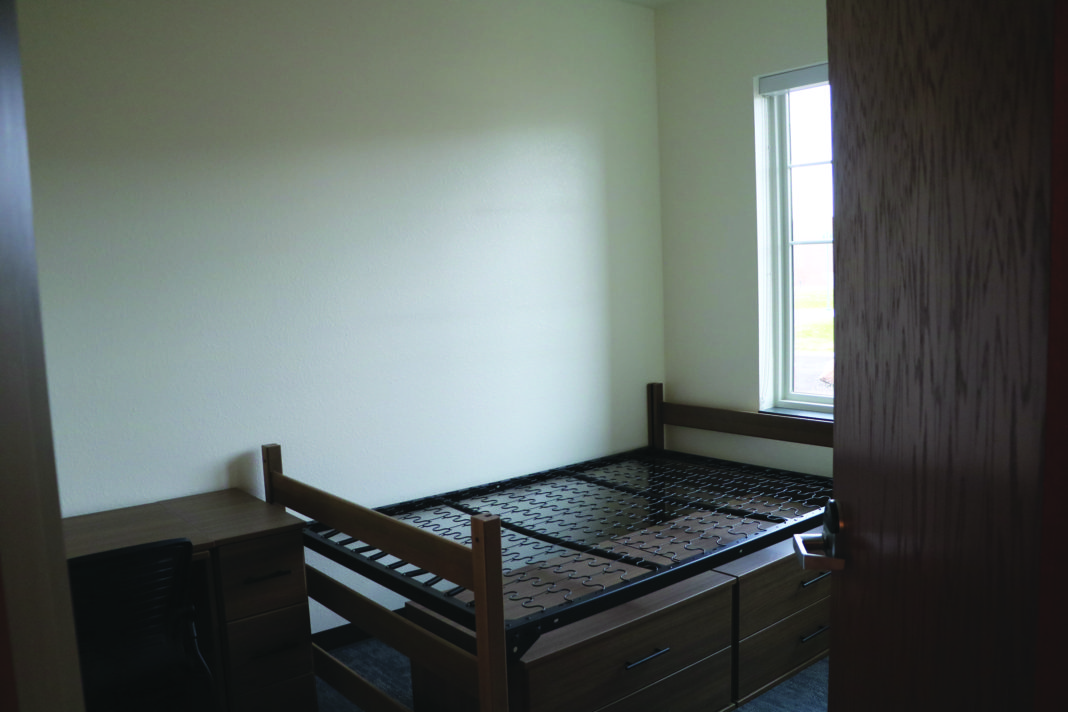As if getting the degree and landing a job in a relevant field wasn’t hard enough, one thing expectant grads also have to face is finding housing after school is over.
With the economy trending the way it is now, renting with roommates seems to be the only feasible immediate option. A 3-bedroom rental runs about $1500 per month in Grand Junction.
Split three ways, $500 per month may seem reasonable and might even give enough room to save up to purchase a home. However, on a gross income of $3000 per month, however, when factoring in expenses like food ($500), fun ($250), utilities ($200), a car ($350) and any debt ($500), that savings margin gets tighter and tighter.
The rising rate of inflation not only increases the amount that everyday goods cost, but also interest rates on mortgages and the value of homes. For those looking to stay in Grand Junction after graduation, that goal is creeping farther out of grasp every day.
The ultimate goal has always been to take out a mortgage for a home and build equity. It is the most common way to build and maintain personal wealth in this country.
In addition, navigating the real estate market is tricky, especially for those that have never purchased a home. There are so many terms and regulations to learn. What type of loans do I qualify for? What documents do I need to apply for a mortgage? What unexpected costs will I face?
These are all reasonable questions to prepare for purchasing a home but it quickly gets overwhelming and the chances of approval are bleak, to say the least.
According to the U.S. Census, Grand Junction has seen an annual population growth of about 1.7% over the last decade and that doesn’t seem to be slowing down anytime soon. This growth has put a strain on the available housing in turn driving up prices even more.
The average cost of a home in Grand Junction, according to Realtor.com, is about $375,000. Assuming a recent graduate is using a 30-year fixed interest FHA First Time Home Buyer Loan, they’ll need to cough up a 3.5% down payment ($13,151), have a credit score above 580, assume the loan at a 7.1% interest rate and pay upfront for closing costs (~$11,000).
That puts the monthly payment at $3,235 including taxes, mandatory private mortgage insurance (PMI) and mandatory homeowner’s insurance. Lenders will only offer a mortgage if that amount is under 30% of the buyer’s monthly income.
This equates to needing an income of approximately $10,000 per month or $120,000 annually. That’s definitely not the average salary of a single student freshly graduated from Colorado Mesa University (CMU). That’s not even the average salary of a dual income household.
For perspective, that income comes out to about $57 per hour. Colorado’s minimum wage is $14.42 per hour.
This also assumes the buyer has absolutely no debt such as student loans, credit cards or a car payment. Needless to say, things look grim.
This growth has also incentivized builders to quickly slap together as many homes as possible wherever land is available for purchase.
Purchasing a new build directly from a contractor is an enticing offer, but comes with many risks. The location is especially critical. In the area outside of Grand Junction city limits, contractors are not required to have any licensure. This means there is technically no formal training required to build an entire subdivision of houses.
While Mesa County does have minimum building codes required for all new residences, they do not address nuances such as the appropriate type of foundation to use in compactable soils, which are extremely common in the valley. If not addressed, the house will practically sink into the ground over time.
If the contractor decides not to address it in a timely manner and the warranty on the house expires, the buyer could be left with an unsafe and eventually unlivable house.
This exact scenario is being played out in a lawsuit between a buyer and a contracting company owned by Mesa County Commissioner Cody Davis.
Large purchases will always take hard work and some sort of risk is associated. However the risks and requirements seem to be stacking higher and higher, especially compared to when boomers were purchasing their homes. Diligence is required.
As if getting the degree and landing a job in a relevant field wasn’t hard enough, one thing expectant grads also have to face is finding housing after school is over.
With the economy trending the way it is now, renting with roommates seems to be the only feasible immediate option. A 3-bedroom rental runs about $1500 per month in Grand Junction.
Split three ways, $500 per month may seem reasonable and might even give enough room to save up to purchase a home. However, on a gross income of $3000 per month, however, when factoring in expenses like food ($500), fun ($250), utilities ($200), a car ($350) and any debt ($500), that savings margin gets tighter and tighter.
The rising rate of inflation not only increases the amount that everyday goods cost, but also interest rates on mortgages and the value of homes. For those looking to stay in Grand Junction after graduation, that goal is creeping farther out of grasp every day.
The ultimate goal has always been to take out a mortgage for a home and build equity. It is the most common way to build and maintain personal wealth in this country.
In addition, navigating the real estate market is tricky, especially for those that have never purchased a home. There are so many terms and regulations to learn. What type of loans do I qualify for? What documents do I need to apply for a mortgage? What unexpected costs will I face?
These are all reasonable questions to prepare for purchasing a home but it quickly gets overwhelming and the chances of approval are bleak, to say the least.
According to the U.S. Census, Grand Junction has seen an annual population growth of about 1.7% over the last decade and that doesn’t seem to be slowing down anytime soon. This growth has put a strain on the available housing in turn driving up prices even more.
The average cost of a home in Grand Junction, according to Realtor.com, is about $375,000. Assuming a recent graduate is using a 30-year fixed interest FHA First Time Home Buyer Loan, they’ll need to cough up a 3.5% down payment ($13,151), have a credit score above 580, assume the loan at a 7.1% interest rate and pay upfront for closing costs (~$11,000).
That puts the monthly payment at $3,235 including taxes, mandatory private mortgage insurance (PMI) and mandatory homeowner’s insurance. Lenders will only offer a mortgage if that amount is under 30% of the buyer’s monthly income.
This equates to needing an income of approximately $10,000 per month or $120,000 annually. That’s definitely not the average salary of a single student freshly graduated from Colorado Mesa University (CMU). That’s not even the average salary of a dual income household.
For perspective, that income comes out to about $57 per hour. Colorado’s minimum wage is $14.42 per hour.
This also assumes the buyer has absolutely no debt such as student loans, credit cards or a car payment. Needless to say, things look grim.
This growth has also incentivized builders to quickly slap together as many homes as possible wherever land is available for purchase.
Purchasing a new build directly from a contractor is an enticing offer, but comes with many risks. The location is especially critical. In the area outside of Grand Junction city limits, contractors are not required to have any licensure. This means there is technically no formal training required to build an entire subdivision of houses.
While Mesa County does have minimum building codes required for all new residences, they do not address nuances such as the appropriate type of foundation to use in compactable soils, which are extremely common in the valley. If not addressed, the house will practically sink into the ground over time.
If the contractor decides not to address it in a timely manner and the warranty on the house expires, the buyer could be left with an unsafe and eventually unlivable house.
This exact scenario is being played out in a lawsuit between a buyer and a contracting company owned by Mesa County Commissioner Cody Davis.
Large purchases will always take hard work and some sort of risk is associated. However the risks and requirements seem to be stacking higher and higher, especially compared to when boomers were purchasing their homes. Diligence is required.




